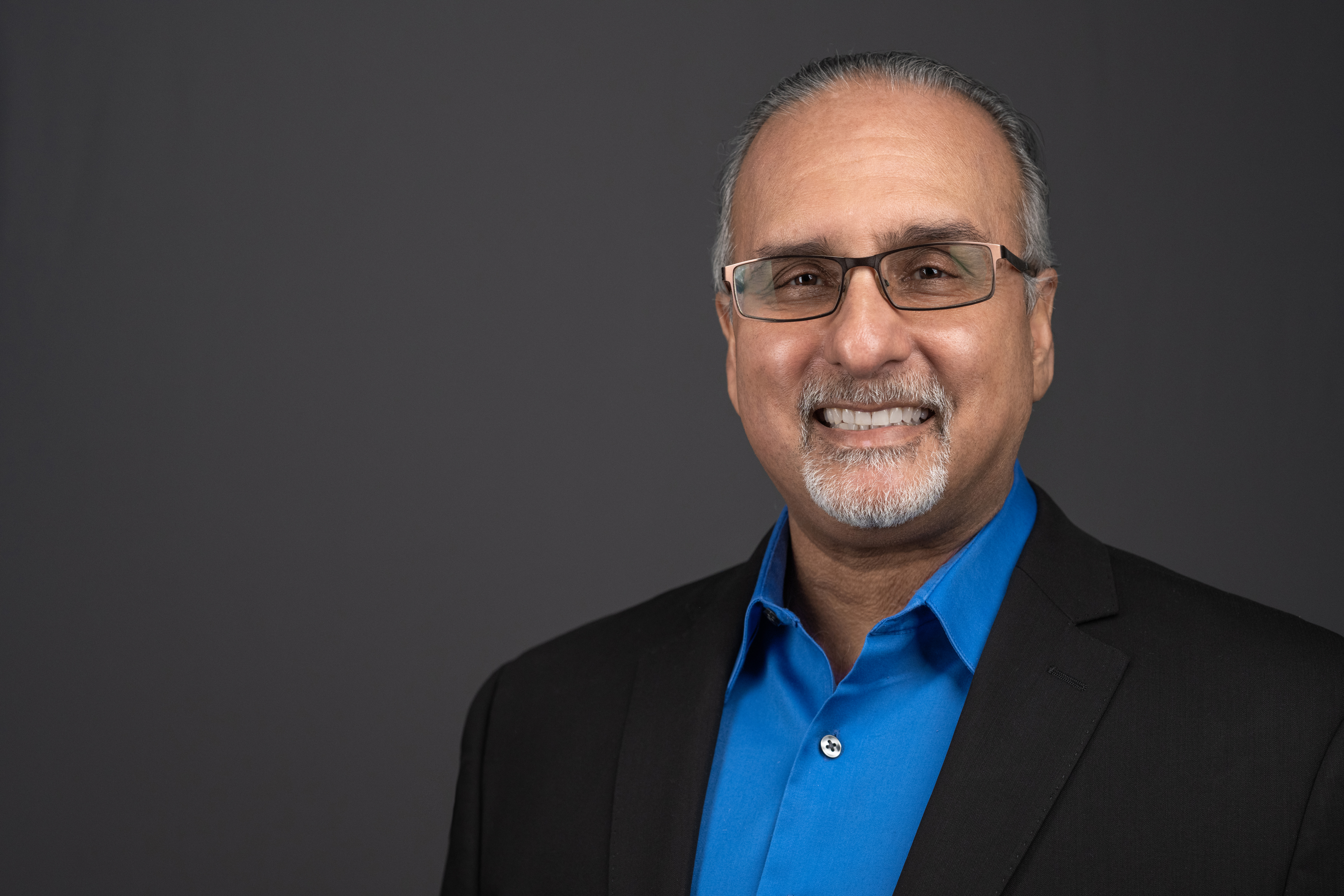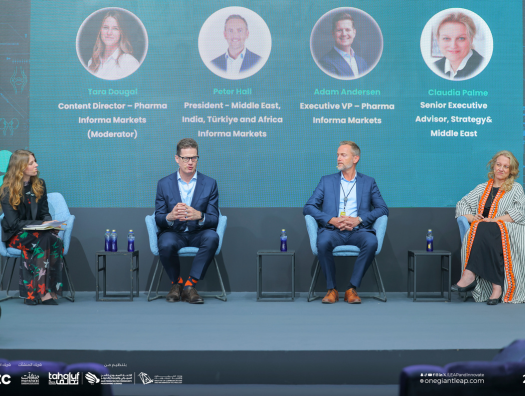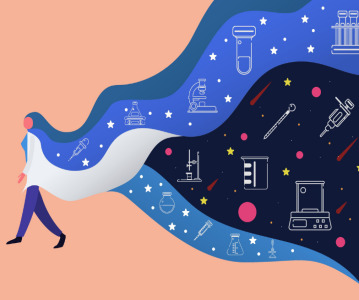A Day in the Life of a President and Chief Scientific Officer
.png)
We are continuing to get to know the people working day-to-day behind the pharma companies shaping the industry, the ones who keep the wheels turning and ultimately bring better healthcare to the population; we are talking to the individuals at the heart of pharma.
In the latest interview, we speak to President and Chief Science Officer of Pharmatech (a USP company), Bikash Chatterjee.
Bikash Chatterjee
I started my career in research as a formulation scientist at Syntex’ Institute of Pharmaceutical Sciences. I was able to work on several important drugs while there and work with some incredibly intelligent people. Most importantly I got a chance to immerse myself in the design and processing of multiple dosage forms.
I moved downstream in the process to the Validation group then ultimately headed up the Manufacturing Engineering group for Syntex Labs which, at that time was a US$2 Billion division. I oversaw 27 packaging lines, all new product introductions, facilities, and capital projects for the site. It was my first foray into middle management, and it was a steep learning curve. I left after almost 10 years because Syntex was acquired by Roche, and I don’t like being in an organisation that is going through an M&A.
I joined a tiny start-up called Abaxis as the Director of Operations and Quality Control. It was an incredible experience having to develop, manage, and deliver with the aid of a huge workforce and budget; it kindled my creative side. I was able to get my first patent for the manufacturing process, and the equipment we built took us through our clinical studies. The company went public then but because of some management issues the stock went into a free fall. I left and joined another start-up called Biotrack as the Head of Engineering. This was a tiny diagnostic company making disposable cartridges for a system that patients could use at home. We were acquired several times moving from Ciba-Geigy to Boehringer-Mannheim to ultimately Roche again.
I was promoted to Plant Manager, and we were able to grow the company from US$10 million to almost US$100 million. I learned so much about discrete manufacturing and we were able to achieve world class process capabilities above 3 for our manufacturing processes.
I left that company to join another exciting start-up – Aradigm – that was developing an inhalable insulin solution targeting Type II diabetic patients. This was an incredible experience in which we had to push the limits of equipment design and material science to create a viable technology. Pfizer had engaged with Nektar to develop a competing powder technology and was about 10 years ahead of us, but we caught up quickly. In the end the FDA was just not ready to approve insulin delivered via inhalation and the stock of the company plummeted again.
I was approached by my long-time friend Calvin Wong to consider consulting and join his firm Pharmatech Engineering. I had never consulted and had no idea how to be a consultant, but I told him I would be happy to help while I was looking for my next career choice. I ended up leading several projects, ranging from pure product development to implementation and validation of packaging vision systems, and I was hooked.
This will be my 21st year with Pharmatech Associates and the projects and extraordinary people I have had the opportunity to work with is incredible. In 2021 we were acquired by the United States Pharmacopeia (USP) as their global consulting arm within their global health group. The nature of the projects we work on today impacts the landscape of healthcare in countries around the world and I am more excited than ever to see what the future will bring.
What would be the perfect start to your day?
One of the nice things of being in our industry for more than 40 years is that I have met a lot of extraordinary people all over the world; people that I have built a friendship with and for whom I have deep respect. For me a perfect start to my day would be hearing from an old friend that I’ve worked with and catching up to ultimately find a project we can do together. Getting to work with old friends you trust and respect is one of the perks of being in this industry for so long.
Could you describe a typical day in your role?
One of the things I like about my job is that my days are never the same. Balancing business with technical leadership can be tricky but it has been one of the hallmarks of our company and one of the things I think that makes us different. Beyond project support work, I may be involved in scoping calls with existing or new clients. On some days I am preparing an article for publication in a journal or webinar or a conference presentation. I make a point of reading multiple technical journals every day and that allows me to stay abreast of the latest innovations, challenges, and opportunities in this rapidly changing industry. My days are never the same, which I love!
What do you most like about your role?
My role is to provide insight to our very talented team of consultants to help our clients achieve their business objectives. We have been involved in several leading-edge programmes where the regulatory and development roadmap has not been well defined. I love dealing with the uncertainty, interacting with health authorities such as the FDA, and working with our clients and internal team to architect a solution that is tailor made for that situation. Bringing together all the considerations in drug development is not easy and it is always satisfying when we are able to overcome an impediment that would have stifled a less creative and experienced group of people.
What made you consider getting into your field in the first place?
I was a summer intern at ALZA which was my first exposure to the industry. Someone from Syntex Research called me to fill a position as a formulation scientist. I fell in love with pharmaceutical research partly because it coalesced all the different pieces of my education. I also felt that I was serving a nobler cause of trying to bring drug therapies to market.
What are the biggest challenges you face?
As CSO it’s challenging to stay on top of industry changes that happen almost daily. Also bringing support to my organisation as they deliver projects at the highest level and finding the right talent to help the company continue to grow.
What would you consider your biggest achievement to date, what are you most proud of?
.png) Building a company that met the exceedingly high standards of a parent company like USP was an acknowledgment of the great work we’ve done over the past decades and the organisation we’ve built. I’m very proud of being a part of USP, a 204-year-old institution whose mission is to bring essential medicines to the people who need them.
Building a company that met the exceedingly high standards of a parent company like USP was an acknowledgment of the great work we’ve done over the past decades and the organisation we’ve built. I’m very proud of being a part of USP, a 204-year-old institution whose mission is to bring essential medicines to the people who need them.
What advice would you give to other people aspiring to your position or getting into this field?
My advice would be to work hard and study hard to get the opportunity to be in this industry. As your career progresses you will find that your success is dependent upon working with other people beyond technical skills. Don’t discount the importance of learning how to get along with others.
What would you like to see from the industry to better support diverse people in STEM?
I’d like to see conduits for all folks to learn more about the industry, and implementing inclusion programs, not because it is a corporate requirement but because diversity spurs creativity and enables all individuals to excel. Advocating and celebrating successes to further promote opportunities in STEM is important.
How can people in your position better support each other?
Professional organisations that cater to folks in my position are very helpful as a sounding board. Joining one of those to collectively share growth and business problems is a great way to pool expertise. It also keeps you from second guessing yourself because you are surrounded by a wealth of knowledge and experience.
Do you have any further career aspirations?
I don’t think I am done yet. I am excited about the work we are doing with companies outside the US. Embracing different cultures and business models is not easy and I am always learning something new from these projects. In my next career I would love to work in some capacity for an organisation that is dealing with larger healthcare questions on a global level. USP has exposed me to this, and it’s been very interesting.
What do you see as the next big opportunity in your sector?
Intelligent application of digital models, AI, and machine learning are going to have a profound impact on our industry. Right now, the efficiency gains from Gen AI and similar large language models (LLM) are just beginning to be felt, but this will have a rapid impact on operational efficiency. The bigger gains will happen when we apply modelling to drug discovery, safety, and even as surrogates to clinical testing.
Who do you look up to in the industry? Who inspires you?
I had the privilege of working with former Commissioner Frank Young who was the commissioner of the FDA under Bush Sr (President George H. W. Bush. Commissioner Young shepherded the country through the AIDS crisis. I knew him late in life at two different companies and we worked closely together to overcome multiple challenges. Even in his 80’s his work ethic was remarkable as was his intellect. He was still excited about bringing new therapies to the market.
How do you incorporate wellbeing into your day?
Wellbeing is one of the most difficult aspects of a successful executive’s life to build in, but it is critical to surviving and thriving as an executive. I borrowed some tactics from friends in China and I start my day with hot water and try to eat healthily during the day. With a hybrid work life, it is easy to get stuck behind a computer all day, so I make sure to get up every hour from my desk and walk around. I also try to take meetings outside when appropriate to get some sunlight and fresh air. Little things like that have a huge compound effect on managing both stress and fatigue.
If you weren’t in this field, what would you being doing?
I have always been interested in technology, likely I would be in development or manufacturing at a large tech company like Google or Apple.
When you were younger, what did you want to be when you grew up?
This will sound weird but in 4th grade I read a book on atomic energy, and I was fascinated by it, so I wanted to be a nuclear physicist. Later in life I wanted to be a doctor but, after many volunteer stints in hospitals, it wasn’t my cup of tea. I could not be happier with the career I ended up with.
Related News
-
News Special Edition Women in Pharma: Women’s health and the pharmaceutical industry
International Women’s Day is an annual celebration of women around the world every March 8. March also marks Women’s History Month. This March, our Women in Pharma series takes a look at how women’s healthcare has developed, and the r... -
News LEAP-ing into the future of pharma – the CPHI Middle East Vision
On March 6, 2024, the CPHI team hosted the Future of Pharma Forum at LEAP 2024, Saudi Arabia’s premier destination for tech leaders and innovators to meet and collaborate. -
News Informa Markets International Women’s Day Panel Discussion
On March 7, 2024, the Informa Markets Amsterdam office hosted an International Women’s Day Breakfast and Panel Discussion to celebrate the women who drive the B2B events industry forward, including members of the CPHI team. -
News CPHI Online Webinar Series – Innovative Strategies for B2B Pharma Marketeers
On February 20, 2024, CPHI Online hosted a webinar on Innovative Strategies for B2B Pharma Marketeers. Featuring expert speakers from across the pharmaceutical value chain, this webinar delves into how B2B pharma marketeers can create better content to... -
News 5 African American Pharmaceutical Pioneers: Honouring Black History Month
In recognition of February as Black History Month in the United States, we cover the lives and works of five pioneering African American pharmaceutical professionals who have contributed significantly to the world of pharmaceuticals and drug devel... -
News What the Novo Holdings and Catalent deal means for pharma outsourcing
On February 5, 2024, Novo Holdings announced their intention to acquire pharma and biotech CDMO Catalent at US$16.5 billion. Read more about what this means for the pharmaceutical industry as a whole, from drugmakers to their partners in manufacturing.... -
News Unpacking what we learnt: Key Pharmapack takeaways with L.E.K. Consulting
After another successful Pharmapack show, we sat down with Karin von Kienlin, Senior Partner at L.E.K. Consulting, to discuss the biggest takeaways and surprises from 2 days of intense discussion and collaboration. -
News Special Edition Women in Pharma: International Day of Women and Girls in Science
In this monthly series, we bring insightful content, events, and communities dedicated to sharing best practices for DE&I strategies and showcasing underrepresented voices in the pharmaceutical community.
Position your company at the heart of the global Pharma industry with a CPHI Online membership
-
Your products and solutions visible to thousands of visitors within the largest Pharma marketplace
-
Generate high-quality, engaged leads for your business, all year round
-
Promote your business as the industry’s thought-leader by hosting your reports, brochures and videos within your profile
-
Your company’s profile boosted at all participating CPHI events
-
An easy-to-use platform with a detailed dashboard showing your leads and performance
.png)

.png)
.png)
.png)
.png)
.png)
